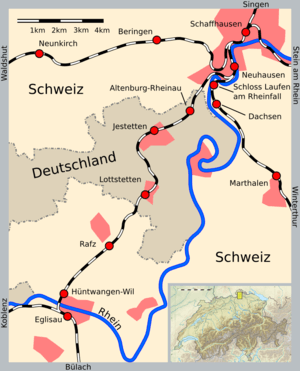Eglisau–Neuhausen railway line
| Eglisau–Neuhausen | |||||||||||||||||||||||||||||||||||||||||||||||||||||||||||||||||||||||||||||||||||||||||||
|---|---|---|---|---|---|---|---|---|---|---|---|---|---|---|---|---|---|---|---|---|---|---|---|---|---|---|---|---|---|---|---|---|---|---|---|---|---|---|---|---|---|---|---|---|---|---|---|---|---|---|---|---|---|---|---|---|---|---|---|---|---|---|---|---|---|---|---|---|---|---|---|---|---|---|---|---|---|---|---|---|---|---|---|---|---|---|---|---|---|---|---|
 | |||||||||||||||||||||||||||||||||||||||||||||||||||||||||||||||||||||||||||||||||||||||||||
| Line length: | 17.88 | ||||||||||||||||||||||||||||||||||||||||||||||||||||||||||||||||||||||||||||||||||||||||||
| Track gauge: | 1435 | ||||||||||||||||||||||||||||||||||||||||||||||||||||||||||||||||||||||||||||||||||||||||||
| Voltage: | 15 kV 16.7 Hz AC | ||||||||||||||||||||||||||||||||||||||||||||||||||||||||||||||||||||||||||||||||||||||||||
| Electrification: | Overhead line | ||||||||||||||||||||||||||||||||||||||||||||||||||||||||||||||||||||||||||||||||||||||||||
| Maximum incline: | 1.3 % | ||||||||||||||||||||||||||||||||||||||||||||||||||||||||||||||||||||||||||||||||||||||||||
Legend
| |||||||||||||||||||||||||||||||||||||||||||||||||||||||||||||||||||||||||||||||||||||||||||
The Eglisau–Neuhausen railway line is a cross-border railway line in Europe.
Description
The line links Eglisau in the Swiss canton of Zurich with the city of Schaffhausen in the Swiss canton of Schaffhausen, crossing some 8 kilometres (5.0 mi) of the German state of Baden-Württemberg in between. It thus crosses the Swiss–German border twice.[1]
The line is 17.88 kilometres (11.11 mi) long, standard gauge and electrified at 15 kV 16 2⁄3 Hz AC supplied by overhead line. The section between Hüntwangen-Wil and Rafz is double track, whilst the rest of the line is single track.[1]
Schaffhausen was first connected to the Swiss railway system in 1857 with the opening of the Rheinfall Railway. Whilst this line was entirely on Swiss soil, and provided a direct link to the city of Winterthur, it only provided a rather indirect route to the rest of Switzerland and the Gotthard Railway. The Swiss Northeastern Railway therefore constructed the Eglisau to Neuhausen line, which opened in 1897.
The construction of the line involved the building of several civil engineering structures, including the 439 metres (1,440 ft) Eglisau railway bridge across the Rhine at the southern end of the line. At the northern end of the line, two tunnels were necessary, with lengths of 112 metres (367 ft) and 144 metres (472 ft).
The whole line, including the section in Germany, now belongs to the Swiss Federal Railways, and is subject to Swiss rail regulations and Swiss domestic rail fares.[1] Besides the junction stations of Eglisau and Neuhausen, there are four intermediate stations, of which two are in Switzerland and two in Germany. A fifth intermediate station, at Altenburg-Rheinau, was closed in 2011.
The line carries an hourly service of long-distance passenger trains between Zurich and Schaffhausen, with some trains operating as far as Frankfurt and Bern. Trains on the Zurich S-Bahn line S5 operate from Zurich as far as Rafz (just before the German border); line S22 provides a local service from Bülach to Schaffhausen.[2] Freight trains also use the line between Germany and the Gotthard route.
Accidents and incidents
On 20 February 2015, a collision occurred between an Interregio train and an S-Bahn train at Rafz.
Gallery
- Rhine falls, with the Eglisau–Neuhausen line on the nearer bank and the Rheinfall line on the far bank
 The Eglisau railway bridge carries the Eglisau–Neuhausen line across the Rhine
The Eglisau railway bridge carries the Eglisau–Neuhausen line across the Rhine Peak hour train between Jestetten and Neuhausen
Peak hour train between Jestetten and Neuhausen
References
External links
 Media related to Eglisau-Neuhausen railway line at Wikimedia Commons
Media related to Eglisau-Neuhausen railway line at Wikimedia Commons